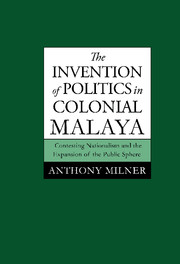 The Invention of Politics in Colonial Malaya
The Invention of Politics in Colonial Malaya Book contents
- Frontmatter
- Contents
- Preface
- Map of Malaya
- Introduction: Colonialism, Nationalism and Contest
- 1 The Ancien Régime: Described and Condemned
- 2 Establishing a Liberal Critique
- 3 A Description of the Real World: Expanding Vocabularies
- 4 Conceptualizing a Bangsa Community: A Newspaper of Moderate Opinions
- 5 Building a Bourgeois Public Sphere
- 6 Ideological Challenge on a Second Front: The Kerajaan in Contest with Islam
- 7 Answering Liberalism: Islamic First Moves
- 8 Kerajaan Self-reform: Chronicling a New Sultanate
- 9 Practising Politics in the Mid-Colonial Period
- 10 Surveying the Homeland: Sedar and Dialogic Processes
- Conclusion: The Malay Political Heritage
- Select Bibliography
- Index
Conclusion: The Malay Political Heritage
Published online by Cambridge University Press: 18 December 2009
- Frontmatter
- Contents
- Preface
- Map of Malaya
- Introduction: Colonialism, Nationalism and Contest
- 1 The Ancien Régime: Described and Condemned
- 2 Establishing a Liberal Critique
- 3 A Description of the Real World: Expanding Vocabularies
- 4 Conceptualizing a Bangsa Community: A Newspaper of Moderate Opinions
- 5 Building a Bourgeois Public Sphere
- 6 Ideological Challenge on a Second Front: The Kerajaan in Contest with Islam
- 7 Answering Liberalism: Islamic First Moves
- 8 Kerajaan Self-reform: Chronicling a New Sultanate
- 9 Practising Politics in the Mid-Colonial Period
- 10 Surveying the Homeland: Sedar and Dialogic Processes
- Conclusion: The Malay Political Heritage
- Select Bibliography
- Index
Summary
We have travelled from nationalism to politics, and in doing so have examined questions of importance for understanding present-day Malay politics. At the outset we noted the danger of structuring colonial Malay social history around the master narrative of the development of nationalism. Concepts of ‘the nation’, it was shown, were enunciated only in the most limited and hesitant way. What preoccupied the ideologues examined in this study was the contest between several social ideals, particularly that between the monarchical vision and two other concepts of community, the first based upon the community of Allah and the other upon Malay ethnicity. The ideals, moreover, were never static. They were persistently reformulated, often in dialogue with one another. Analysing colonial Malay society in this way, I have countered the incremental development of nationalism with an alternative image of fluidity and contest. In the course of this study, however, there has emerged one vital qualification to such an interpretation.
In an important sense, my project was hijacked. The initial aim was to avoid the ‘retrospective’ creation of master narratives, and to investigate a series of textual episodes in the subversion of Malay royal authority. By demonstrating the range and character of ideological debate in Malay society, I expected to be able to evoke the element of contest rather than consensus.
In many parts of the world, the “destruction of royal authority”, as Michael Walzer has noted, “was a long and difficult process” which frequently entailed a “sense of adventure and of danger”.
- Type
- Chapter
- Information
- The Invention of Politics in Colonial MalayaContesting Nationalism and the Expansion of the Public Sphere, pp. 282 - 297Publisher: Cambridge University PressPrint publication year: 1995


